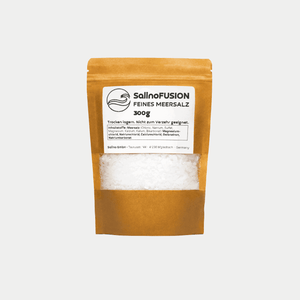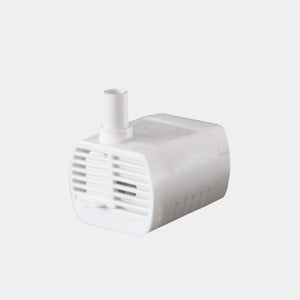Breathe in the salt spray

Anyone who has ever stood in front of a graduation tower knows this feeling: the air tastes faintly of the sea, carries a cool breath, and with every breath your chest seems to free up.
North Rhine-Westphalia is home to some of Germany's most beautiful and largest spas – from the imposing graduation walls in Bad Salzuflen to the well-maintained facilities in Grugapark Essen or Bad Westernkotten. These are quiet, powerful places where history, architecture, and health converge.
Here, saline water trickles over blackthorn brushwood, dispersing into a fine aerosol and creating a microclimate reminiscent of the North Sea or Baltic Sea. For many people, such places are an integral part of their respiratory care routine; for others, they're an occasional excursion.
But those who go regularly quickly realize that between the entrance fee, the journey, and the time spent, the visits add up. This leads some to think about bringing the salty experience home—perhaps with a mini-salt bath, which makes the effect available daily and often pays for itself in just a few months.
Bad Salzuflen Graduation Tower - the queen of the graduation towers
Bad Salzuflen doesn't have "salt" in its name for nothing. With three graduation towers in the spa gardens, the town offers one of the most impressive salt air ensembles in Europe. The large graduation tower on Parkstraße stretches from the spa gardens' main entrance along the Rose Garden to the Schliepstein Gate and measures approximately 120 meters. Numerous benches on both sides of the graduation tower invite you to linger.
The graduation tower, with its striking clock tower at Parkstrasse 20, features a covered walkway, a sun deck, and a saltwater Kneipp arm basin. At 55 meters long and approximately 8.5 meters high, it is an impressive facility. The historic clock tower rises a further 6 meters above the entire structure.
The indoor-accessible graduation tower, located between the concert hall and the spa guest center, was inaugurated in 2007. It features relaxation niches inside, a saltwater mist chamber with gentle music, and a colorfully changing starry sky—a multisensory experience that goes far beyond simply inhaling salt air.
Walking along the blackthorn walls, you can hear the steady trickle of the brine water like a gentle rain. Visitors often report that the first deep breaths taste cool and spicy, followed by a gentle relaxation in the chest. Every day, approximately 600,000 liters of brine trickle down the mighty blackthorn walls – an impressive natural spectacle.
Historically, the facilities served for salt production; today they are the heart of a modern spa town where health and relaxation go hand in hand. Those who arrive early in the morning, when the mist still hangs over the meadows, will experience the salty air at its clearest.
Tip: Visit the Bad Salzuflen graduation tower early in the morning for the most intense salt air experience.
Gradierwerk Grugapark Essen - salt air in the heart of the city

In the heart of the Ruhr region, surrounded by urban life, lies Grugapark – and within it lies a graduation tower that seems like a small natural wonder. It's not a historic giant like the one in Bad Salzuflen, but a more compact yet modern facility, built specifically for visitors to momentarily escape the urban climate.
The park's entrance fees are moderate, but regular visitors will find that the expenses add up. Working people, in particular, use the graduation tower as a short break during their lunch break or after work. The interplay of city noise outside and the salty silence inside has its own charm – a transition from everyday life to tranquility that's rarely found in the middle of an urban environment.
Grugapark itself is a green oasis with over 60 hectares of botanical collections, themed gardens, and event spaces. The graduation tower blends harmoniously into this diversity and offers another facet of the park. Many visitors combine their visit to the graduation tower with a leisurely stroll through the various garden areas.
Gruga Park, with its graduation tower, is a valuable retreat, especially for people from the densely populated Ruhr region. The salty air offers a contrast to the often polluted city air and is perceived by many as a real relief for the respiratory system.
Gradierwerk Bad Westernkotten - Double pack for salt air fans
Bad Westernkotten, a district of Erwitte, surprises visitors with two graduation towers located within sight of each other. The larger one towers imposingly over the spa gardens, while the smaller, more compact counterpart has an almost familiar feel.
The natural brine from the "Westernkottener Warte" brine spring trickles down the blackthorn twigs, creating healthy aerosols for outdoor inhalation. The fine mist created by the graduating of the natural brine provides the saline air surrounding the graduation towers – a blessing for the respiratory tract. The aerosols exert a mild irritant effect on the bronchi, have an anti-inflammatory effect, and help facilitate coughing.
Together, the two graduation towers create a microclimatic center that has shaped the area for decades. Those who visit both experience varying intensities of salt air, almost completing a mini-treatment in a single day.
Especially in the morning, when dew still lingers on the wooden beams, the brine's full, fresh character unfolds. At the two large graduation towers in the spa gardens, you can breathe in the salty air – similar to that at the sea. The facilities are freely accessible and are used intensively by the local population.
Bad Westernkotten is a recognized salt and mud spa and has made a name for itself in North Rhine-Westphalia's health landscape over the decades. The two graduation towers are a central part of this profile.
Gradierwerk Bad Sassendorf - Tradition meets innovation
The graduation tower in Bad Sassendorf, in the Soest district, has been completely renovated in recent years and is now one of the most modern facilities in North Rhine-Westphalia. Its architecture combines traditional construction with contemporary elements, including comfortable seating areas and a barrier-free design.
Families, seniors, and professionals alike use the resort—some for a day trip, others for short, regular inhalations. The new technology ensures even distribution of the brine, noticeably improving air quality. Bad Sassendorf is known as a brine and mud spa, combining various natural remedies into a holistic concept.
Bad Sassendorf's spa gardens are spacious and, in addition to the graduation tower, also feature hiking trails, sunbathing lawns, and a barefoot path. Many visitors appreciate the combination: a stroll through the park, a visit to the graduation tower, followed by a mud bath or a visit to the thermal spa. This diversity makes Bad Sassendorf an attractive destination for health-conscious visitors.
Its location in the Soest district, between Dortmund and Paderborn, makes the town easily accessible. Many visitors come from all over the Ruhr region to spend a day or a weekend here. The renovated graduation tower is often their first stop.
Gradierwerk Bad Oeynhausen - spa town with tradition
Bad Oeynhausen, located in the Minden-Lübbecke district, is one of North Rhine-Westphalia's most traditional spa towns. The graduation tower in the spa gardens is part of a long history dating back to the 19th century. The town became known for its thermal brine springs and developed into an important health resort.
The graduation tower blends harmoniously into the expansive spa park, which, with its mature trees, well-kept paths, and neoclassical spa buildings, creates a special atmosphere. Visitors describe their stay as a journey back in time: The architecture recalls the great era of spa baths, while the salty air exudes a timeless, natural healing power.
The brine in Bad Oeynhausen is particularly rich in minerals and is considered particularly effective. Many spa guests combine a visit to the graduation tower with treatments in the thermal baths or in the city's numerous health clinics. Bad Oeynhausen is also known for its cardiovascular clinics and has made a name for itself as a center for cardiology.
Day visitors can combine a visit to the graduation tower, a stroll through the spa gardens, and a stroll through the city center. The town has retained its charm and combines historic flair with modern health facilities.
Gradierwerk Hamm - salt air in the Maximilianpark spa gardens
Hamm, the largest city in the Arnsberg administrative district, has a graduation tower integrated into the spa gardens. The facility is part of the city's health concept and is used by both locals and visitors.
The graduation tower in Hamm is freely accessible and offers a convenient way to experience the salt air. Many local residents incorporate a daily walk around the graduation tower into their routine—a form of preventative health that can be achieved without much effort. Families with children especially appreciate the park, which, in addition to the graduation tower, also offers playgrounds and recreational activities.
The city of Hamm has invested heavily in its health infrastructure in recent years, and the graduation tower is a visible symbol of these efforts. It demonstrates that salt air can find its place not only in traditional spa towns, but also in larger cities.
Conclusion: Salt air - between excursion and everyday life

The graduation towers in North Rhine-Westphalia demonstrate the diversity of salt air experiences in Germany's most populous state. Bad Salzuflen impresses with its three different graduation towers, ranging from traditional open-air experiences to multi-sensory indoor experiences. Grugapark Essen proves that salt air can also have an impact in the heart of a big city.
Bad Westernkotten surprises with its double graduation tower, while Bad Sassendorf combines modern technology with traditional design. Bad Oeynhausen represents the great tradition of German spa towns, and Hamm demonstrates how graduation towers in larger cities can contribute to local health infrastructure.
Graduation towers in North Rhine-Westphalia are far more than tourist destinations. They are places where you can literally breathe deeply, nestled in parks and urban landscapes, where time and noise stand still for a moment. Anyone who has the opportunity should visit these facilities—not only for the health benefits, but also for the atmosphere they exude.
Keeping an eye on costs
But regular visits also mean effort: travel, admission fees, often several hours, which must be fitted into a busy schedule. Admission to Grugapark Essen costs about €4-8, depending on the season. With two visits per week, the monthly cost is approximately €32-64.
From Düsseldorf to Bad Salzuflen, it's about 180 kilometers, from Cologne to Bad Westernkotten about 120 kilometers. Even from Dortmund to Bad Sassendorf, it's another 40 kilometers. With multiple trips per week, the kilometers quickly add up to considerable costs.
For those who want to regularly enjoy the benefits of salty air, a home solution can be worthwhile. Salt air devices, such as a mini saltworks, produce comparable salt air in your own home, without travel and regardless of opening hours.
In many cases, the initial investment pays for itself in just a few months, compared to the expenses for regular graduation tower visits. Assuming monthly costs of €100 for admission and travel expenses, this amounts to €1,200 annually—a sum that often justifies the purchase of a high-quality mini-saltworks in the first year.
Your next steps
- Plan your visit: Find out about opening hours and directions to the graduation towers in your area
- Try several locations: Each graduation tower has its own character
- Consider a home solution: If you need it regularly, a mini saline can be a practical alternative
So the decision ultimately remains a matter of personal lifestyle: the conscious ritual of an outing or daily availability at home. Salt air, whether in the spa gardens or in the living room, remains a silent ally for the respiratory system, skin, and well-being—and a piece of nature that can reach us even far from the sea.
The graduation towers in North Rhine-Westphalia will continue to attract visitors. They are historical monuments, architectural gems, and places of encounter. However, for everyday life, for daily respiratory care, and for integrating salt air into a holistic health concept, a home-based solution can be the ideal complement – without replacing the experience of the large-scale facilities, but rather extending it into everyday life.
(Image sources: Adobe Stock)



